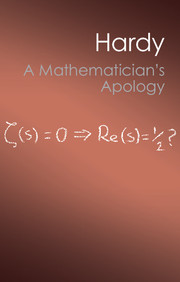18
Published online by Cambridge University Press: 05 August 2014
Summary
There is still one point remaining over from §11, where I started the comparison between ‘real mathematics’ and chess. We may take it for granted now that in substance, seriousness, significance, the advantage of the real mathematical theorem is overwhelming. It is almost equally obvious, to a trained intelligence, that it has a great advantage in beauty also; but this advantage is much harder to define or locate, since the main defect of the chess problem is plainly its ‘triviality’, and the contrast in this respect mingles with and disturbs any more purely aesthetic judgement. What ‘purely aesthetic’ qualities can we distinguish in such theorems as Euclid's and Pythagoras's? I will not risk more than a few disjointed remarks.
In both theorems (and in the theorems, of course, I include the proofs) there is a very high degree of unexpectedness, combined with inevitability and economy. The arguments take so odd and surprising a form; the weapons used seem so childishly simple when compared with the far-reaching results; but there is no escape from the conclusions. There are no complications of detail—one line of attack is enough in each case; and this is true too of the proofs of many much more difficult theorems, the full appreciation of which demands quite a high degree of technical proficiency.
- Type
- Chapter
- Information
- A Mathematician's Apology , pp. 112 - 115Publisher: Cambridge University PressPrint publication year: 2012

